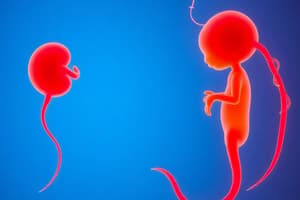Podcast
Questions and Answers
Apa yang terjadi pada embrio setelah pembuahan?
Apa yang terjadi pada embrio setelah pembuahan?
- Pembelahan sel zigosit terhenti.
- Embrio langsung berkembang menjadi individu dewasa.
- Embrio mengalami beberapa tahap morfogenesis sebelum lahir sebagai individu dewasa. (correct)
- Sel-sel dalam blastosis membentuk jaringan tambahan di luar embrio.
Proses apa yang dimulai oleh penyatuan satu sel sperma dengan satu sel telur?
Proses apa yang dimulai oleh penyatuan satu sel sperma dengan satu sel telur?
- Pembentukan jaringan ekstra embrio
- Pelepasan enzim pencernaan oleh sel telur
- Aktivasi telur dan perkembangan embrio awal (correct)
- Pembelahan sel
Apa yang terjadi saat reaksi akrosom terjadi pada sel sperma?
Apa yang terjadi saat reaksi akrosom terjadi pada sel sperma?
- Lapisan di sekitar kepala sel sperma pecah. (correct)
- Spermatozoa kehilangan motilitasnya.
- Telur tidak lagi dapat membelah.
- Inti sperma memasuki sitoplasma sel telur.
Bagaimana peran motilitas sperma dalam proses pembuahan?
Bagaimana peran motilitas sperma dalam proses pembuahan?
Apa yang menyebabkan embrio mulai membagi dan mengalami perkembangan?
Apa yang menyebabkan embrio mulai membagi dan mengalami perkembangan?
Apa peran yang paling signifikan dari antibodi dalam sistem kekebalan tubuh?
Apa peran yang paling signifikan dari antibodi dalam sistem kekebalan tubuh?
Imunitas yang didapat atau vaksinasi sering disebut sebagai?
Imunitas yang didapat atau vaksinasi sering disebut sebagai?
Kelas antibodi yang paling banyak ditemukan dan memberikan perlindungan jangka pendek serta jangka panjang adalah?
Kelas antibodi yang paling banyak ditemukan dan memberikan perlindungan jangka pendek serta jangka panjang adalah?
Apa fungsi utama IgE dalam sistem kekebalan tubuh?
Apa fungsi utama IgE dalam sistem kekebalan tubuh?
Apa peran utama IgM dalam respons kekebalan tubuh?
Apa peran utama IgM dalam respons kekebalan tubuh?
Flashcards are hidden until you start studying
Study Notes
Reproductive Biology
Reproductive biology is a fascinating field of study that encompasses various aspects of life processes related to reproduction. It involves understanding the mechanisms that lead from conception to birth, including sexual reproduction, reproductive systems, and developmental biology. Here's a more detailed exploration of these key areas:
Sexual Reproduction
Sexual reproduction is a process in which offspring are produced from two parent organisms of different sexes. This type of reproduction combines genetic material from both parents, ensuring genetic variation within species. In most multicellular animals, this involves external or internal fertilization following sexual intercourse between male and female individuals. For example, humans reproduce through copulation, where sperm cells from the male enter the female reproductive system and fuse with an egg cell from the female to form a zygote.
Reproductive Systems
The reproductive systems of males and females differ significantly due to their roles in producing gametes—sex cells such as eggs or sperm. Females have a reproductive tract that includes ovaries, fallopian tubes, uterus, and vagina, while males possess testicles, vas deferens, seminal vesicle, prostate gland, and penis. These structures facilitate the production and transfer of gametes during sexual reproduction. Hormones play a crucial role in regulating the function of these organs throughout the reproductive cycle.
Developmental Biology
Developmental biology focuses on how embryos develop into complex adult forms. After fertilization, the zygote begins to divide rapidly, forming a ball of cells called a blastocyst. Some cells in the blastocyst become part of the developing embryo, while others give rise to extra-embryonic tissues like the yolk sac and amniotic membrane. As the embryo continues to grow and develop, it undergoes several stages of morphogenesis before being born as a fully formed individual.
Fertilization
Fertilization is the fusion of one sperm cell with one egg cell, resulting in a single diploid cell called a zygote. This event triggers the activation of the egg and initiates early embryonic development. Sperm motility is essential for reaching the egg, and specific chemical signals guide them towards the ovum within the female reproductive tract. Once inside the egg, multiple events occur:
- Acrosome reaction: A layer surrounding the head of the sperm cell breaks open, releasing digestive enzymes that dissolve the protective layers around the egg.
- Penetration: The sperm nucleus enters the egg cytoplasm, causing the egg to begin dividing and embryonic development to commence.
Understanding these biological phenomena helps us appreciate the complexity of human reproduction and enables researchers to address issues related to infertility or contraception.
Studying That Suits You
Use AI to generate personalized quizzes and flashcards to suit your learning preferences.




